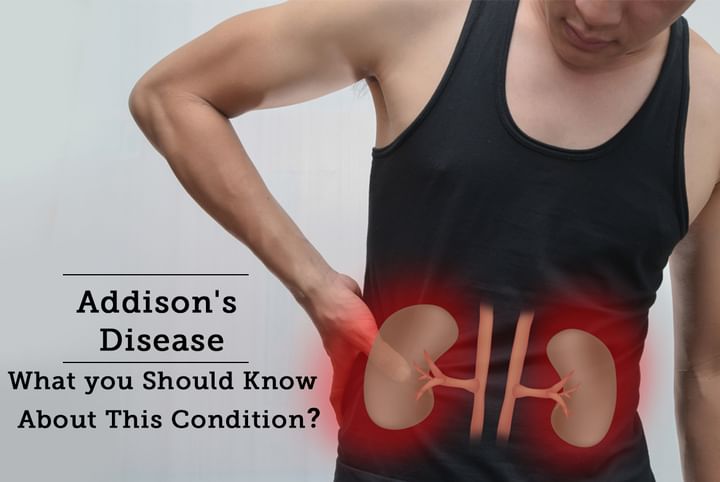Addison's Disease: What You Should Know About This Condition?
Addison’s disease is a rare ailment that is caused by the destruction of the adrenal glands, which sit atop your kidneys. As a result of this disease, your body cannot produce sufficient amounts of aldosterone and cortisol hormones. Aldosterone helps regulate potassium and sodium in your body, while cortisol helps the body to fight off infections in a stressful condition.
Causes of Addison’s disease
Two conditions are responsible for the onset of Addison’s disease, namely – Primary Adrenal Insufficiency and Secondary Adrenal Insufficiency.
-
Primary Adrenal Insufficiency – This refers to an autoimmune disease, where the adrenal glands are attacked by your immune system and are severely damaged.
-
Secondary Adrenal Insufficiency – This occurs when your pituitary glands are unable to produce ACTH or adrenocorticotropic hormones, which directs the adrenal glands into releasing hormones.
Symptoms of Addison’s disease
Addison’s disease is usually characterized by the following symptoms –
-
Tiredness and fatigue
-
Darkening of the skin
-
Decreased appetite resulting in weight loss
-
Blood sugar levels dropping down
-
Reduced blood pressure and heart rate
-
Fainting spells
-
Craving for sodium
Aldosterone helps your kidneys regulate the amount of salt and water in your body. When aldosterone levels drop too low, your kidneys cannot keep your salt and water levels in balance which leads to low levels of sodium and high levels of potassium in the blood. When the level of sodium in your blood drops, you become dehydrated. Severe dehydration and a low sodium level reduce blood volume. If left untreated, the disease may lead to an adrenal crisis. Severe abdominal pain, profound weakness, extremely low blood pressure, kidney failure, and shock may occur.
If the initial symptoms of Addison’s disease go unobserved and are left untreated, the condition may worsen. It can even lead to an Addisonian crisis – a fatal condition that requires immediate medical intervention. Consult a doctor at the earliest if you encounter these signs –
-
Change of mental state – fear, restlessness, confusion
-
Loss of consciousness
-
Sudden pain in the legs, lower back, and belly
-
High fever
Risk Factors
The following factors may put you at risk of developing Addison’s disease –
-
Chronic infections – for example, tuberculosis
-
Intake of anticoagulants or blood thinners
-
An autoimmune disorder, such as Grave’s disease or Type 1 diabetes
-
A previous surgery where a portion of the adrenal gland was removed
Treatment of the Disease
Prior to the treatment, your doctor will review your medical history and perform a thorough physical examination and a few lab tests to monitor your sodium-potassium levels. An imaging test may also be recommended to measure hormone levels.
Depending on the causes of the condition, the doctor will ascertain the line of treatment.
-
A combination of glucocorticoids medications and drugs may be given to prevent inflammation and improve overall health
-
Hormone replacement therapies can replace the insufficient amount of hormones produced by adrenal glands
-
Alternative therapies like yoga and meditation are prescribed to release stress
People diagnosed with Addison’s disease may have to depend on different treatment approaches all their lives. As long as you stick to the treatment plan, you may be able to live a productive life.


+1.svg)
